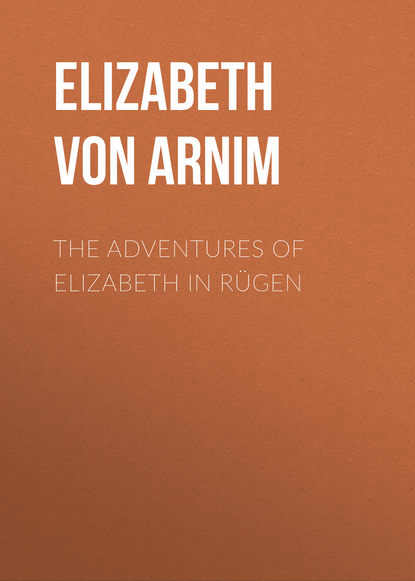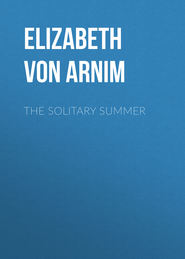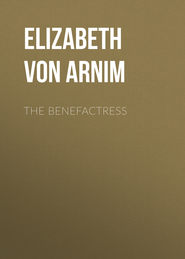По всем вопросам обращайтесь на: info@litportal.ru
(©) 2003-2024.
✖
The Adventures of Elizabeth in Rügen
Настройки чтения
Размер шрифта
Высота строк
Поля
'He hasn't an idea, poor innocent, that you don't—that you no longer–'
'I have as much courage as other people, but I don't think there's enough of it for explaining things to the mother. You see, she's the wife of a bishop.'
Not being so well acquainted as Charlotte with the characteristics of the wives of bishops I did not see; but she seemed to think it explained everything.
'Doesn't she know about your writings?' I inquired.
'Oh yes, and she came to a lecture I gave at Oxford—the boy is at Balliol—and she read some of the pamphlets. He made her.'
'Well?'
'Oh she made a few conventional remarks that showed me her limitations, and then she began about Bernhard. To these people I have no individuality, no separate existence, no brains of my own, no opinions worth listening to—I am solely of interest as the wife of Bernhard. Oh, it's maddening! The boy has put I don't know what ideas into his mother's head. She has actually tried to read one of Bernhard's works, and she pretends she thought it sublime. She quotes it. I won't stay at Binz. Let us go on somewhere else to-morrow.'
'But I think Binz looks as if it were a lovely place, and the Harvey-Brownes look very nice. I am not at all sure that I want to go on somewhere else to-morrow.'
'Then I'll go on alone, and wait for you at Sassnitz.'
'Oh, don't wait. I mightn't come to Sassnitz.'
'Oh well, I'll be sure to pick you up again somewhere. It isn't a very big island, and you are a conspicuous object, driving round it.'
This was true. So long as I was on that island I could not hope to escape Charlotte. I entered Binz in a state of moody acquiescence.
Every hotel was full, and every room in the villas was taken. It was the Göhren experience over again. At last we found shelter by the merest chance in the prettiest house in the place—we had not dared inquire there, certain that its rooms would be taken first of all—a little house on the sands, overhung at the back by beechwoods, its windows garnished with bright yellow damask curtains, its roof very red, and its walls very white. A most cheerful, trim little house, with a nice tiled path up to the door, and pots of geraniums on its sills. A cleanly person of the usual decent widow type welcomed us with a cordiality contrasting pleasantly with the indifference of those widows whose rooms had been all engaged. The entire lower floor, she said, was at our disposal. We each had a bedroom opening on to a verandah that seemed to hang right over the sea; and there was a dining-room, and a beautiful blue-and-white kitchen if we wanted to cook, and a spacious chamber for Gertrud. The price was low. Even when I said that we should probably only stay one or two nights it did not go up. The widow explained that the rooms were engaged for the entire season, but that the Berlin gentleman who had taken them was unavoidably prevented coming, which was the reason why we might have them, for it was not her habit to take in the passing stranger.
I asked whether it were likely that the Berlin gentleman might yet appear and turn us out. She stared at me a moment as though struck by my question, and then shook her head. 'No, no,' she said decidedly; 'he will not appear.'
A very pretty little maidservant who was bringing in our luggage was so much perturbed by my innocent inquiry that she let the things drop.
'Hedwig, do not be a fool,' said the widow sternly. 'The gentleman,' she went on, turning to me, 'cannot come, because he is dead.'
'Oh,' I said, silenced by the excellence of the reason.
Charlotte, being readier of speech, said 'Indeed.'
The reason was a good one; but when I heard it it seemed as if the pleasant rooms with the beds all ready and everything set out for the expected one took on a look of awfulness. It is true it was now past eight o'clock, and the sun had gone, and across the bay the dusk was creeping. I went out through the long windows to the little verandah. It had white pillars of great apparent massiveness, which looked as though they were meant to support vast weights of masonry; and through them I watched the water rippling in slow, steely ripples along the sand just beneath me, and the ripples had the peculiar lonely sound that slight waves have in the evening when they lick a deserted shore.
'When was he expected?' I heard Charlotte, within the room, ask in a depressed voice.
'To-day,' said the widow.
'To-day?' echoed Charlotte.
'That is why the beds are made. It is lucky for you ladies.'
'Very,' agreed Charlotte; and her voice was hollow.
'He died yesterday—an accident. I received the telegram only this morning. It is a great misfortune for me. Will the ladies sup? I have some provisions in the house sent on by the gentleman for his supper to-night. He, poor soul, will never sup again.'
The widow, more moved by this last reflection than she had yet been, sighed heavily. She then made the observation usual on such occasions that it is a strange world, and that one is here to-day and gone to-morrow—or rather, correcting herself, here yesterday and gone to-day—and that the one thing certain was the schönes Essen at that moment on the shelves of the larder. Would the ladies not seize the splendid opportunity and sup?
'No, no, we will not sup,' Charlotte cried with great decision. 'You won't eat here to-night, will you?' she asked through the yellow window-curtains, which made her look very pale. 'It is always horrid in lodgings. Shall we go to that nice red-brick hotel we passed, where the people were sitting under the big tree looking so happy?'
We went in silence to the red-brick hotel; and threading our way among the crowded tables set out under a huge beech tree a few yards from the water to the only empty one, we found ourselves sitting next to the Harvey-Brownes.
'Dear Frau Nieberlein, how delightful to have you here again!' cried the bishop's wife in tones of utmost cordiality, leaning across the little space between the tables to press Charlotte's hand. 'Brosy has been scouring the country on his bicycle trying to discover your retreat, and was quite disconsolate at not finding you.'
Scouring the country in search of Charlotte! Heavens. And I who had dropped straight on top of her in the waters of Thiessow without any effort at all! Thus does Fortune withhold blessings from those who clamour, and piles them unasked on the shrinking heads of the meek.
Brosy Harvey-Browne meanwhile, like a polite young man acquainted with German customs, had got out of his chair and was waiting for Charlotte to present him to me. 'Oh yes, my young philosopher,' I thought, not without a faint regret, 'you are now to find out that your promising and intellectual Fräulein isn't anything of the sort.'
'Pray present me,' said Brosy.
Charlotte did.
'Pray present me,' I said in my turn, bowing in the direction of the bishop's wife.
Charlotte did.
At this ceremony the bishop's wife's face took on the look of one who thinks there is really no need to make fresh acquaintances in breathless hurries. It also wore the look of one who, while admitting a Nieberlein within the range of her cordiality on account of the prestige of that Nieberlein's famous husband, does not see why the Nieberlein's obscure female relatives should be admitted too. So I was not admitted; and I sat outside and studied the menu.
'How very strange,' observed Brosy in his beautifully correct German as he dropped into a vacant chair at our table, 'that you should be related to the Nieberleins.'
'One is always related to somebody,' I replied; and marvelled at my own intelligence.
'And how odd that we should meet again here.'
'One is always meeting again on an island if it is small enough.'
This is a sample of my conversation with Brosy, weighty on my part with solid truths, while our supper was being prepared and while Charlotte answered his mother's questions as to where she had been, where she had met me, how we were related, and who my husband was.
'Her husband is a farmer,' I heard Charlotte say in the dreary voice of hopeless boredom.
'Oh, really. How interesting,' said Mrs. Harvey-Browne; and immediately ceased to be interested.
The lights of Sassnitz twinkled on the other side of the bay. A steamer came across the calm grey water, gaily decked out in coloured lights, the throbbing of her paddle-wheels heard almost from the time she left Sassnitz in the still evening air. Up and down the road between our tables and the sea groups of bath-guests strolled—artless family groups, papa and mamma arm in arm, and in front the daughter and the admirer; knots of girls in the backfisch stage, tittering and pushing each other about; quiet maiden-ladies, placid after their supper, gently praising, as they passed, the delights of a few weeks spent in the very bosom of Nature, expatiating on her peace, her restfulness, and the freshness of her vegetables. And with us, while the stars flashed through the stirring beech leaves, Mrs. Harvey-Browne rhapsodised about the great Nieberlein to the blank Charlotte, and Brosy tried to carry on a reasonable conversation about things like souls with a woman who was eating an omelette.
I was in an entirely different mood from the one of the afternoon at Vilm, and it was a mood in which I like to be left alone. When it is on me not all the beautiful young men in the world, looking like archangels and wearing the loveliest linen, would be able to shake me out of it. Brosy was apparently in exactly the same mood as he had been then. Was it his perennially? Did he always want to talk about the Unknowable, and the Unthinkable, and the Unspeakable? I am positive I did not look intelligent this time, not only because I did not try to, but because I was feeling profoundly stupid. And still he went on. There was only one thing I really wanted to know, and that was why he was called Brosy. While I ate my supper, and he talked, and his mother listened during the pauses of her fitful conversation with Charlotte, I turned this over in my mind. Why Brosy? His mother kept on saying it. To Charlotte her talk, having done with Nieberlein, was all of Brosy. Was it in itself a perfect name, or was it the short of something long, or did it come under the heading Pet? Was he perhaps a twin, and his twin sister was Rosy? In which case, if his parents were lovers of the neat, his own name would be almost inevitable.
It was when our supper had been cleared away and he was remarking for the second time—the first time he remarked it I had said 'What?',—that ultimate religious ideas are merely symbols of the actual, not cognitions of it, and his mother not well knowing what he meant but afraid it must be something a bishop's son ought not to mean said with gentle reproach, 'My dear Brosy,' that I took courage to inquire of him 'Why Brosy?'
'It is short for Ambrose,' he answered.
'He was christened after Ambrose,' said his mother,—' one of the Early Fathers, as no doubt you know.'
But I did not know, because she spoke in German, for the sake, I suppose, of making things easier for me, and she called the Early Fathers frühzeitige Väter, so how could I know?
'Frühzeitige Väter?' I repeated dully; 'Who are they?'











